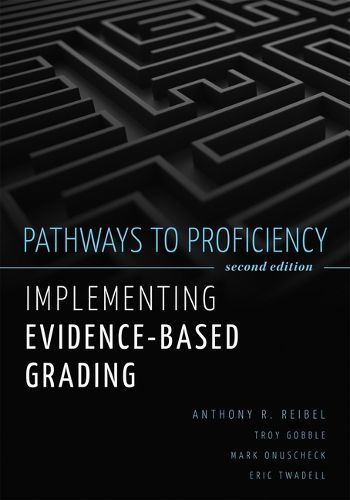Readings Newsletter
Become a Readings Member to make your shopping experience even easier.
Sign in or sign up for free!






Transform your school's grading practices with this updated second edition on evidence-based grading. The book provides a five-phase process for moving beyond standards-based and competency-based grading models. Administrators and teachers will gain understanding of the core principles of evidence-based assessment, refocus assessments on proficiency, embrace student self-assessment, determine grades based on bodies of work and trends, and create a systemwide transformation of grading practices.
K-12 administrators can use this book to:
Propose, design, and evaluate new grading practices based on student performance Lead and organize the implementation of evidence-based grading policies and practices Establish clearer guidelines, benchmarks, and standards of student performance Navigate common pitfalls when transitioning to a new evidence-based assessment model Enhance student performance through more consistent feedback and stronger mentorship
Contents:
Introduction: A Case for a Better Way to Grade Chapter 1: Preparation--Core Commitments Chapter 2: Incubation--Unexpected Connections Chapter 3: Insight--Critical Discoveries Chapter 4: Evaluation--Key Questions Chapter 5: Elaboration--Essential Realizations Epilogue Appendix A: Evidence-Based Grading Gradebook Hacks Appendix B: Other Evidence-Based Grading Impacts Appendix C: Converting a Unity of Study to Evidence-Based Grading References and Resources Index
$9.00 standard shipping within Australia
FREE standard shipping within Australia for orders over $100.00
Express & International shipping calculated at checkout
Transform your school's grading practices with this updated second edition on evidence-based grading. The book provides a five-phase process for moving beyond standards-based and competency-based grading models. Administrators and teachers will gain understanding of the core principles of evidence-based assessment, refocus assessments on proficiency, embrace student self-assessment, determine grades based on bodies of work and trends, and create a systemwide transformation of grading practices.
K-12 administrators can use this book to:
Propose, design, and evaluate new grading practices based on student performance Lead and organize the implementation of evidence-based grading policies and practices Establish clearer guidelines, benchmarks, and standards of student performance Navigate common pitfalls when transitioning to a new evidence-based assessment model Enhance student performance through more consistent feedback and stronger mentorship
Contents:
Introduction: A Case for a Better Way to Grade Chapter 1: Preparation--Core Commitments Chapter 2: Incubation--Unexpected Connections Chapter 3: Insight--Critical Discoveries Chapter 4: Evaluation--Key Questions Chapter 5: Elaboration--Essential Realizations Epilogue Appendix A: Evidence-Based Grading Gradebook Hacks Appendix B: Other Evidence-Based Grading Impacts Appendix C: Converting a Unity of Study to Evidence-Based Grading References and Resources Index